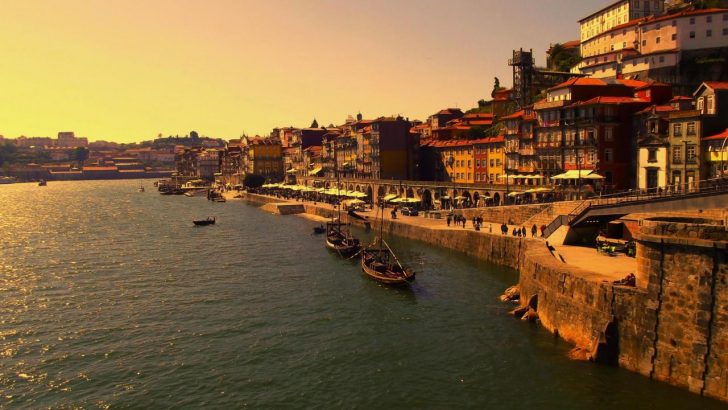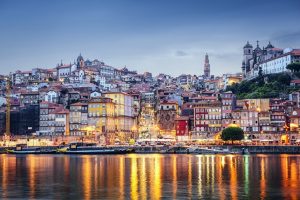Portugal effortlessly combines the old with the new, taking visitors from remote islands to the tops of mountains!
This little corner of Europe was once the center of a global empire, so the history runs deep.
You’ll see it everywhere—in crumbling castles, Roman ruins, and those gorgeous blue-and-white tiles (called azulejos) that decorate buildings all over the country.
People love visiting here, and it’s easy to see why.
The weather’s great, the landscapes are surprisingly varied, and there’s something for everyone.
Up in the north, you’ve got Porto and the Douro Valley—perfect for wine lovers.
Central Portugal feels like stepping back in time, with its ancient university town of Coimbra and the rugged Serra da Estrela mountains.
Lisbon? It’s this buzzing mix of old-world charm and coastal cool.
Then there’s the Algarve in the south, where the beaches and cliffs will blow you away.
Portugal has a way of making you feel welcome. Maybe it’s the locals, who are friendly without being pushy, or the food—don’t leave without trying a pastel de nata or the freshest seafood you’ll ever eat.
Oh, and it’s safe and pretty affordable, too, which never hurts.
Whether you’re here for the history, the landscapes, or just to slow down and soak it all in, you’ll find yourself falling for Portugal.
One quick tip—don’t speak Spanish here.
It can be seen as an insult. In fact, it’s better to use English than Spanish!
Keep reading for more advice.
Warnings & Dangers in Portugal

OVERALL RISK: LOW
The risk is low, according to government advisories, local crime stats, and tourist reviews. Plus, there's a lot to see and do in this amazing country.

TRANSPORT & TAXIS RISK: LOW
Public transport in Portugal is generally safe, but pickpocketing can occur on crowded buses, trams, and metro lines, particularly in Lisbon. Official taxis and ride-hailing services like Bolt and Uber are reliable, but unlicensed taxis should be avoided to prevent overcharging or scams. Always confirm fares before starting trips.

PICKPOCKETS RISK: LOW
Pickpocketing is the most common issue for tourists, especially in crowded areas like public transport, busy squares, and markets. Keep wallets, phones, and bags secured, and avoid displaying valuables. Crossbody bags with zippers or anti-theft features are a smart choice for peace of mind.

NATURAL DISASTERS RISK: LOW
The risk is low here. Portugal has occasional risks of wildfires during the hot summer months, particularly in forested and rural areas. Coastal regions may experience minor earthquakes, but severe ones are rare. Stay informed of local warnings and avoid hiking in high-risk wildfire zones during extreme heat.

MUGGING RISK: LOW
Mugging incidents are uncommon in Portugal, but they can happen in less crowded areas at night. Avoid walking alone in poorly lit streets, especially in unfamiliar neighborhoods. The risk is low.

TERRORISM RISK: LOW
Portugal has a low terrorism risk and is not a common target for attacks. However, as with traveling anywhere, remain aware of your surroundings and follow any local security advisories. Major events or crowded places warrant a bit of extra vigilance. Countries like the U.S. have programs like STEM that allow you to get travel warnings and have ready information if you need to reach an embassy.

SCAMS RISK: MEDIUM
Tourist-targeted scams are rare but do happen, especially in busy tourist zones. Watch out for fake petitions, overpriced restaurant menus, or unsolicited offers for tours. Always book through reputable sources, confirm prices upfront, and avoid overly pushy salespeople or "too good to be true" deals. However, that advice holds true for everywhere. Treat it as a medium risk just to be safe.

WOMEN TRAVELERS RISK: LOW
This is a low risk. Portugal is considered safe for groups or solo female travelers, with minimal harassment issues. Use the same precautions you would anywhere—avoid walking alone late at night in isolated areas, and trust your instincts.

TAP WATER RISK: LOW
Portugal’s tap water is safe to drink across the country, meeting EU quality standards. In older buildings, plumbing may affect taste, so bottled water is sometimes preferred. Even if you choose to drink bottled water, don't worry about brushing your teeth or bathing with tap water. The risk is low.
Safest Places to Visit in Portugal
VisitPortugal.com is the country’s official tourism website, but each major city or region will likely have a more hyper-local online guide.
It will also help to know local naming conventions, like Lisbon is spelled Lisboa in Portuguese.
The tourism website is visitlisboa.com.
We talked a little earlier about the various regions of the country, but let’s highlight some of the top attractions.
Portugal is home to 17 UNESCO World Heritage Sites as well as several Cultural Heritage Sites.
Here are some of the top options:
- Sintra’s Cultural Landscape: A magical mix of palaces, gardens, and forests, Sintra was a romantic retreat for royalty and artists.
- Historic Centre of Porto: Porto’s old town, with its medieval streets and riverside charm, highlights its significance in wine trade and maritime history.
- Monastery of Batalha: A Gothic masterpiece built to celebrate Portugal’s independence in 1385, it’s a symbol of national pride.
- University of Coimbra: Founded in 1290, it’s one of Europe’s oldest universities, renowned for its Baroque library and academic traditions.
- Évora’s Historic Centre: Encircled by medieval walls, Évora boasts Roman, Moorish, and Gothic influences.
Beach lovers should look for the EU Blue Flag designation, which is awarded to locations that meet high environmental, safety, and quality standards.
The Algarve region leads with 86 Blue Flag beaches, but nearly 400 Blue Flag beaches are located nationwide.
If you prefer to head for the hills (or mountains), put Serra da Estrela on your itinerary.
This rugged escape into Portugal’s highest mountains is perfect for hiking or even skiing in winter.
If you plan to visit the islands, you should know that another passenger flight will be required.
Choose from Azores or Madeira, divided between two archipelagos.
- Azores (Açores): This archipelago consists of 9 islands, including São Miguel, Terceira, and Pico. Known for volcanic landscapes, crater lakes, and geothermal activity, the Azores are a haven for adventure seekers.
- Madeira: This archipelago has 4 inhabited islands (Madeira and Porto Santo being the most well-known) and several smaller uninhabited ones, like the Desertas and Selvagens Islands. Madeira is famous for its lush scenery, hiking trails, and mild climate.
Ferries do run between the islands but not to the mainland.
Places to Avoid in Portugal
Portugal is generally a safe destination for travelers, with low rates of violent crime.
However, crime rates have increased recently.
Portugal is a safe place to visit, with low violent crime rates overall, but it’s worth noting that crime has ticked up a bit recently.
That doesn’t mean you need to stress, but being aware of your surroundings is always a smart move.
In Lisbon, the vibe is friendly, but areas like Intendente, Anjos, and Cais do Sodré can see more pickpocketing—especially at metro stops and in the nightlife scene.
It’s the same story in Porto, where spots like Cerco do Porto and parts of Antas have a bit of a reputation.
Even the sunny beaches aren’t immune.
Tourist hotspots like Costa da Caparica and Guincho occasionally report thefts, so keep an eye on your belongings while you soak up the sun.
These areas aren’t off-limits, and there’s no need to avoid them entirely.
Just be a little extra cautious, particularly at night, and you’ll enjoy all that Portugal has to offer without a hitch.
Safety Tips for Traveling to Portugal
- In Portugal, you can contact the police by dialing 112, the emergency number for all services, including police, fire, and medical assistance. For non-emergencies, visit the nearest Polícia de Segurança Pública (PSP) station, often found in major towns and cities.
- Emergency alerts in Portugal are broadcast through the Sistema Nacional de Alerta de Emergência (SIRESP). That includes radio, TV, and mobile phone notifications during major emergencies like wildfires or severe weather. Travelers can also download the ANEPC Proteção Civil app or enable emergency alerts on their phones for real-time updates.
- I could write a whole article about the tolls when driving around Portugal. Check out the various rules and regulations, plus ways to pay on the ctt.pt website. It will default to Portuguese, but you should be able to change the browser to your language.
- In Portugal, they don’t rush through meals. While that’s a helpful tidbit to take your time, it will impact you practically, since many businesses close up between 1 pm and 3 pm for lunch. Expect this in the smaller communities, not major cities like Lisbon.
- Fishing, diving, and boating all come with specific requirements. For example, fishing requires a license, which can be obtained at various ATMs. Just be sure to use a Multibanco bank machine. Check these requirements before you go.
- When dining in Portugal, you’ll likely have a platter of bread, olives, and cheese on the table. These are not free. If you eat any portion of the food, you’ll be charged. It’s not like some American restaurants that give bread or chips away for free.
- If you’re from a non-EU country, look into the VAT (value-added tax) reimbursement for qualifying purchases. You will need to get receipts and a form as you buy things to be eligible for money back.
- Crossing between Portugal and Spain is straightforward, as both countries are part of the Schengen Zone. What does that mean for a visitor? Border-free travel between the two countries! Don’t leave your passport or paperwork behind, but you likely won’t get stopped going back and forth.
- It’s expected to offer thanks when someone does something for you, but the wording is critical. As one Redditor stated, “…for the love of all things holy, don’t say ‘Gracias.'” You can use the English words “Thank You,” but you’ll get bonus points for saying ‘obrigado’ if you’re a man or ‘obrigada’ if you’re a woman.
- Bring comfortable footwear. Between the hills of Lisbon and the cobblestone streets across the country, flip-flops, sandals, and heels will have your feet aching in no time.
So... How Safe Is Portugal Really?
Portugal is widely regarded as a safe destination for travelers, consistently ranking high on global peace and safety indices.
Those rankings include being one of the five safest countries in Europe, as reported by the World Population Review, and the seventh most peaceful country, as ranked by the Global Peace Index.
Petty crimes like pickpocketing are the most common issues for visitors, especially in crowded tourist areas and on public transportation.
However, I could say the same thing about my community.
In addition, the United States, United Kingdom, and Canada all have the lowest possible travel advisory for Portugal.
That’s saying something because, if anything, they are prone to being extra cautious (and some might say exaggerating) risks sometimes.
One thing to note, if for nothing more than extra motivation to use excellent personal safety steps—justice can be hard to come by in Portugal.
The court backlog spans years.
Overall, nothing should make you think twice about visiting Portugal.
How Does Portugal Compare?
| Country | Safety Index |
|---|---|
| Portugal | 57 |
| Morocco | 54 |
| Australia | 86 |
| Slovakia | 80 |
| Greece | 73 |
| Norway | 85 |
| Mauritius | 80 |
| Kazakhstan | 72 |
| Germany | 85 |
Useful Information

Visas
Portugal is part of the Schengen Zone. Visitors from most non-EU countries, including the U.S. and Canada, can stay visa-free for up to 90 days. Ensure your passport is valid for three months beyond departure. For longer stays or specific purposes, check with your local Portuguese consulate.

Currency
Portugal uses the euro (€). ATMs, called "Multibancos," are widely available and reliable. Credit cards are accepted widely, but some restaurants and shops only accept cash. Notify your bank of your travel plans to avoid issues with international transactions or currency exchange fees.

Weather
Portugal enjoys a Mediterranean climate with hot, dry summers and mild, rainy winters. Coastal cities like Lisbon and Porto are cooler, while inland areas like Alentejo are warmer. Pack layers year-round, as evenings can get chilly, especially in spring and fall.

Airports
Portugal’s main airports are Lisbon (LIS), Porto (OPO), and Faro (FAO), offering international and domestic flights. Lisbon Airport is the busiest hub, while Faro primarily serves the Algarve region.

Travel Insurance
We highly recommend travel insurance for Portugal and any international destination. Most policies cover unexpected medical emergencies, cancellations, lost luggage, and other travel hiccups. EU travelers with an EHIC card receive healthcare benefits, but others should double-check that coverage extends to Portugal-specific needs. Medical evacuation insurance is a recommended policy by the U.S. State Department.
Portugal Weather Averages (Temperatures)
Average High/Low Temperature
| Temperature / Month | Jan | Feb | Mar | Apr | May | Jun | Jul | Aug | Sep | Oct | Nov | Dec |
|---|---|---|---|---|---|---|---|---|---|---|---|---|
| High °C | 15 | 17 | 20 | 23 | 26 | 29 | 30 | 30 | 27 | 23 | 19 | 16 |
| Low °C | 7 | 9 | 12 | 15 | 18 | 21 | 22 | 22 | 19 | 15 | 11 | 8 |
| High °F | 59 | 63 | 68 | 73 | 79 | 84 | 86 | 86 | 81 | 73 | 66 | 61 |
| Low °F | 45 | 48 | 54 | 59 | 64 | 70 | 72 | 72 | 66 | 59 | 52 | 46 |
Portugal - Safety by City
| City | Safety Index |
|---|---|
| Lisbon | 81 |
| Porto | 58 |












4th safest country in the world
Why Portugal got yellow color??
It´s the fourth safest country in the world.
The lowest homicide rate in Europe.
No terrorist attacks.
Bad road safety!
To be considered one of the safest – all safety aspects should be met. Road safety is horrible in Portugal!
The 57 thing is just ridiculous. It is one of the safest Western European countries to live and visit.
True! Unbelievable!
Not even a single Terrorism Event recorded
Spain has a Safety Index of 83 and has 2 Topics considered being of “High Risk”, Portugal only has 1 and gets an Index of 57?? And not to mention that Terrorism in Portugal is nonexistent.
We´ve lived here for 15 years and travelled to many different towns & cities with 2 young boys. Never had any problems. I feel completely safe even when I´m on my own.
My husband dropped his wallet & phone at a petrol station and a kind man phoned several of the numbers, one of which was mine. He arranged to meet us to hand it back and would only accept a small coffee as payment for his time and effort.
When we first arrived my husband left his backpack with Euros 2000 in cash at a restaurant. When we went back a few hours later the smiling lady handed it over, nothing missing.
Super friendly & safe. Not deserving of such a low score.
Portugal is Very Safe
Portugal is ranked as the THIRD safest country on the Global Peace Index.
We’ve lived in Portugal for over two years and hardly ever hear about any major crime.
This site needs to fix their rankings.
I jused to live 15 months in Lisbon.
It’s very safe, only there are some shitty (I think mostly not local) pickpockets at same part of the city, mostly in the touristical Bairro Alto, around Erasmus Corner… My phone has been stolen from my bag(!!) on the extremly crowded street, whole I was talking with friends (and I was sober)! And I red about a looooot of people in a FB group, who’s phone also got stolen there.
But except of that, that you have to take care of your belongings, you don’t have to sorry about anything. I never saw any fight or something. There are police men everywhere, even at Lidl’s. 😀
😌♥️🇵🇹
Deserves better than 57!
Why does Portugal only get 57? It is one of the safest countries in Europe! I have lived and worked in various places across Portugal over the years, and have never really come close to any problems, apart from their terrible driving skills! I currently live in London which is much more dodgy!
My favourite in Europe
The third safest country in the world! Amazing place and people, food to die for. Why is this website rating it only at 57?
Safe and sound
The 57 rating takes away all credibility of your website. I live in Lisbon and this is by far among the most peaceful and safest countries in the world.
What’s even more astounding is that despite plenty of comments similar to mine, no web admin has taken to respond to justify the low rating or fixed it.
Very peaceful and safe like few!
Abso-bloody-lutely ridiculous, gSus! Portugal got 57 whatever-points below some countries where terrorism and violent crime truly exists. In all major rankings from almost every source that measures safety in a country, Portugal is always in the top 5 alongside countries like Iceland and New Zealand, just to name a few. 57 points? Not even 75 points would make justice to one of the most friendly, peaceful and safest countries in the entire world. I would highly suggest to whoever ranked Portugal with 57 points to review his Math classes. Definitely above 90 points… I would clearly say a 95 or 97!
I am astonished that you think that Portugal deserves a better score than Japan. Other than that, I definitely agree with you.
One of the safest country
Completely wrong, should be green.
Who put these numbers together? I think you guys need to revisit your ranking calculation because it is severely faulty. Portugal has consistently ranked in the top 3-4 safest countries in the world. Do your numbers represent data from the 70’s – 80’s? This was my first time visiting this website, and it will be my last. There are much better/more accurate travel information websites around for anyone to waste there time (as I have) on this p.o.s site.
I agree with the majority of the rest. I have lived in Portugal for years and married to a Portuguese citizen and it is definitely one of the most civilised and safest countries from top to bottom and also the islands, so you really need to get the rating correctly adjusted. As one commentator mentioned the main danger in Portugal is the absolutely terrible driving standards, you really need to be careful on the road and when near roads, apart from that life is tranquil.
CHANGE THE SCORE
Portugal is one of the safest countries in the world. The score should be changed.
The only problem I can think of is pickpocketing in major cities. Everything else is beyond safe.
LivedThereFor25Years
As others have said, fix the score. Your current score has it as more dangerous than Mexico. That’s insane. Portugal is consistently ranked one of the safest countries on the planet.
Pickpocketing is a thing in big touristy areas, but that’s basically it.
You can’t possibly have it in the same category of danger as Mexico. Pure insanity.
BS score
This makes no sense. Visited Portugal several times and it’s the safest country in Europe
Peaceful country
Portugal is really safe, in fact it is in the top ten list of highest peace index. Why is the safety number 57? The overall risk says Low.
Great country to visit!
Portugal is definitely a place to visit; safety wise, i have NEVER encountered a problem. i always take public transport and NEVER ever felt endangered or came across unpleasant experiences. People are indeed friendly and helpful. Theft during the dictatorship was something unheard off, and this is still prevalent amongst the Portuguese. Pickpocketing does occur (like in any busy place) and is usually done by gypsies (truly sorry for having to write this, wish i didn’t have to), but Lisbon has cracked down on that. I was there 3 months ago and it felt so good. The temperature chart is somewhat wrong. July can be over 30° in Lisbon and central Portugal, and in places like Evora close to 45.
I’ve been here nearly half-a-dozen times now (I’m a UK resident), and I agree with everyone else that the 57 score is much too low. We stay with family here and don’t often visit major cities, though, and yes – go to an airport or railway station and you should be careful of pickpockets – but try and find a country where that’s not a problem (you can’t). I demand that the people who wrote this go and review this thing, and their life choices.
Safe
I visited both Lisboa ans porto and I felt safe in both cities.
Portugal is amazing!
The 57 score is madness! Portugal has systematically been in the TOP 5 of safest countries IN THE WORLD for years!
It’s a modern, clean, safe country, and the people are great. Sure, cities such as Lisbon or Oporto may have their issues (like any other major center or tourist area in the world) but… Portugal should have a score of +95!
Portugal having a lower score than the United States is insanity.